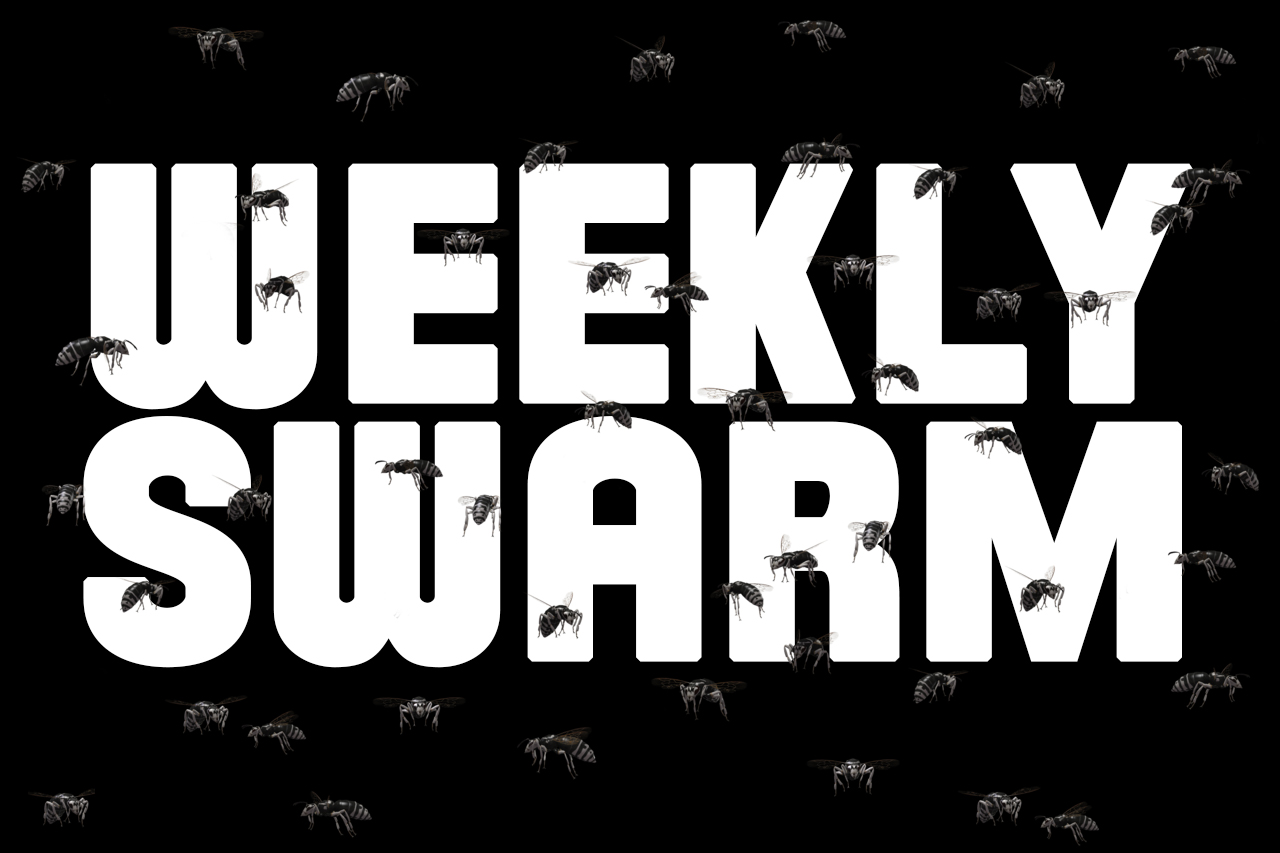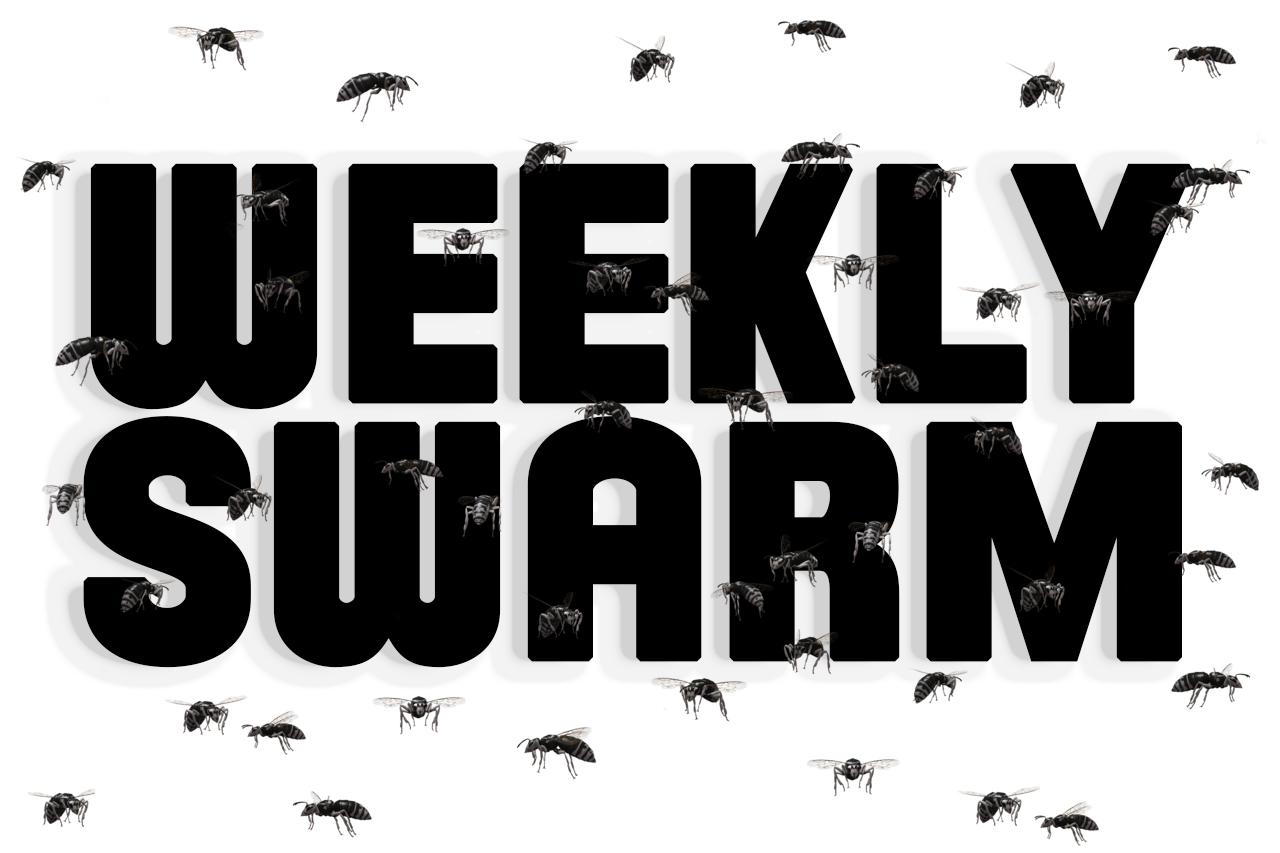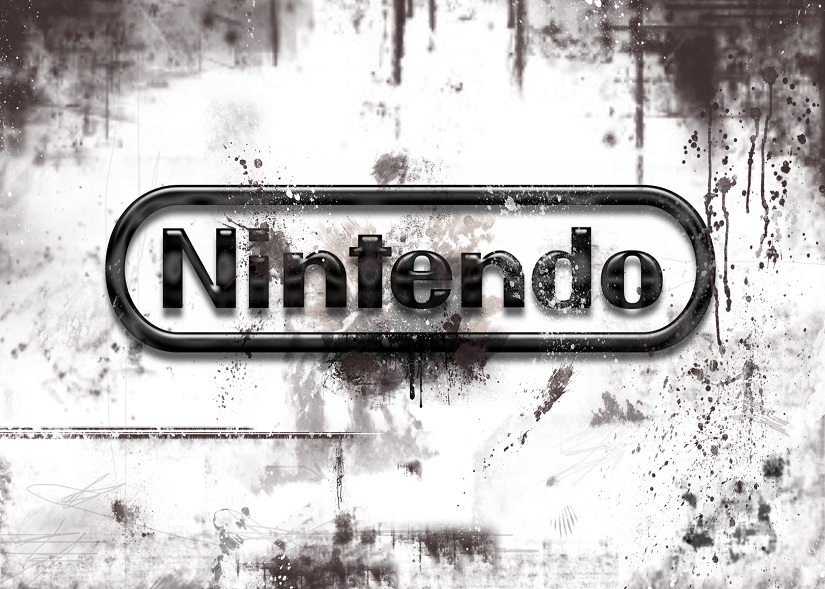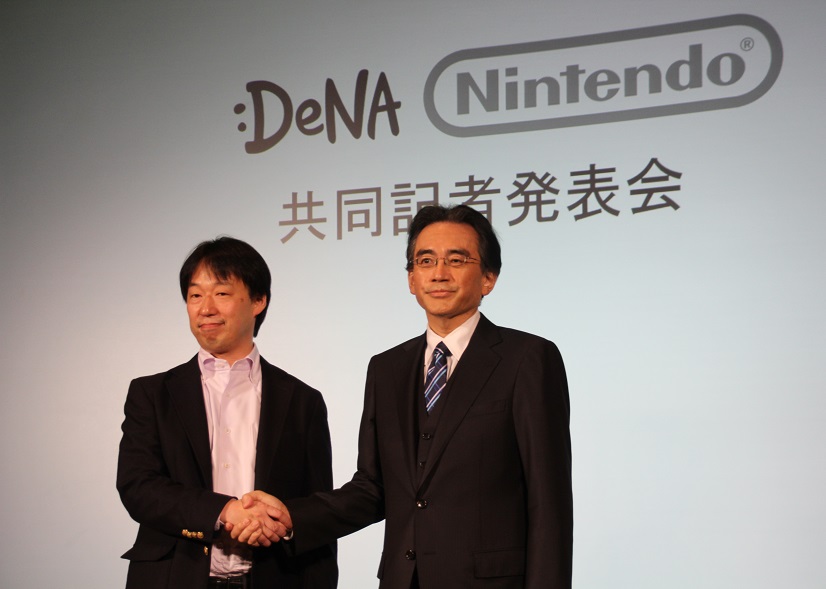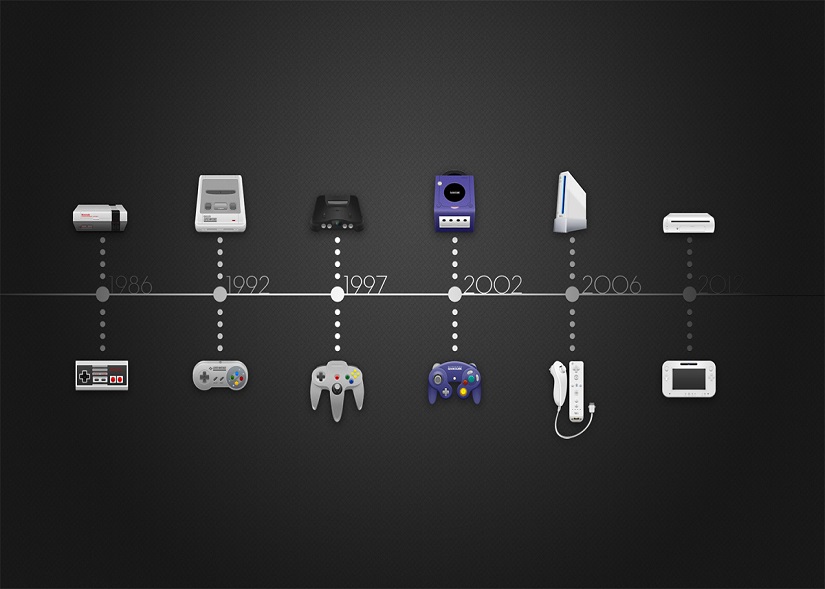[The Weekly Swarm] 3/30 - 4/5
We had a short week last week, but not one without some strong editorials from our team. Angela shared her photos from SXSW 2015, illustrating just how lovely and diverse Austin becomes during the annual festival. I reviewed SXSW darling film Uncle John, as well as shared my interview with the film's writers, directors, and lead actor. Xander reviewed the latest installment in the Fast & Furious franchise, Furious 7. Hubert wrote about Wrestlemania 31 and its ability to entice former wrestling fans. You can find all of this and more below!
[RH Photos] The Culture Clash at SXSW 2015
[SXSW Review] Uncle John
[Review] Furious 7
[Weekly Netflix Fix] First April Update
[SXSW Interview] Steven Piet, Erik Crary, John Ashton (Uncle John)
WrestleMania 31: Results and Match Reviews
[Weekly Netflix Fix] First April Update
[This Week In TV] Archer; Community; New Girl
[The Weekly Swarm] 3/23 - 3/29
Last week featured some of my reviews and interviews from SXSW, including Turbo Kid, which was my absolutely favorite film of the festival, Oswald wrote a wonderful editorial about Kumiko, the Treasure Hunter and the racial insensitivities of its protagonist, Bridjet reviewed the wonderful FROOT album by Marina and the Diamonds, Travis rounded up some choice albums from 2015's first quarter, Xander revisited Doctor Who's "Rose" episode, Bridjet shared her thoughts on Girls' Season 4, and Hubert provided a very in-depth and entertaining preview for last night's Wrestlemania 31. Find all this and more below!
[SXSW Review] Fresno
[SXSW Video Interview] Paul Feig and Melissa McCarthy (Spy)
[Weekly Netflix Fix] Final March Update
[SXSW Review] The Boy
[Review] White God
Kumiko, the Treasure Hunter's Character Problem
[Review] Get Hard
[SXSW Review] Turbo Kid
[SXSW Video Interview] RKSS (Writers/Directors of Turbo Kid)
[Review] Marina and the Diamonds: "FROOT"
[American Idol-izer] Top 9 Perform
[Video Playlist of the Week] Girl Power
First Quarter Album Round-up
Girls Season 4 Recap
Fox Reopens The X-Files For Six Episode Miniseries
WrestleMania 31: Final Card Preview and Match Predictions
[American Idol-izer] Top 9 Perform
[Weekly Netflix Fix] Final March Update
Ten Years Of Modern Doctor Who: Revisiting 'Rose'
[This Week In TV] The Flash; Arrow; Agents Of SHIELD
Ten Years Of Modern Doctor Who: Revisiting 'Rose'
Doctor Who celebrated its fiftieth anniversary two years ago, and celebrates its tenth anniversary today. What else would you expect from a series which has never placed much stock in keeping its timelines in order? Just ask UNIT in the late '70s. Or should that be mid-70s? Fantastic. Anyhow, where the 50th anniversary marked the birthday of 'The Unearthly Child', the series' very first episode back in 1963, today's tenth anniversary marks a decade since Russell T. Davies revived the show following sixteen years off-air, barring one ill-fated television movie, and set the stage for what would grow from a cultish British sci-fi curiosity into a genuine transatlantic phenomenon.
Re-watching 'Rose', the first episode of the revived series (or New Who, as it's colloquially known), is fascinating not only in light of how drastically the series has evolved over time, but also how fully-formed the most important aspects of the show were right out of the gate. The most immediately striking difference is between the creative focus of the man in charge then, Russell T. Davies, and the man in charge now, Steven Moffat. The very first shot, swooping from an orbital shot of earth down to Rose Tyler's buzzing alarm clock, establishes perhaps the single definining theme of Davies' tenure: contrasting the grand majesty of space and time with the humble, messy lives of your workaday human. Where Moffat's characters function as cogs in their creator's cosmic clock, Davies rejoices in the silly essentialness of mundane existence. Rose may not find much fulfilment in her shopgirl routine, but in Davies' eyes, there's something magical in being that one amongst millions, rummaging around for a place in humanity's buzzing, living hive.
How Mobile Gaming Could Save Nintendo's Next Console
Nintendo confirmed at a press conference this week that their next console, codenamed the 'NX', was on the way, with more details set to be revealed in 2016. That the company is working on the Wii U's successor is hardly a surprise, having been hinted at much several times over, though the fact this news attracted so much attention despite only being revealed as a way of quashing any speculation of Nintendo quitting the dedicated hardware market - having been announced at the same time as the company's plan to licence its characters out for mobile game development - shows how important a place the company occupies in gaming culture even with the abject failure of their most recent home console.
The Wii U has yet to cross the 10 million global sales mark, having been available to buy since Christmas 2012. By contrast, the company's previous low watermark for home console sales, the GameCube, sold 22 million units between 2001 and its discontinuation in 2007, while the Xbox One and Playstation 4 have already outsold the U despite launching a year later. Sales of the 3DS have been more stable, shifting a creditable 50m units as of December last year. This pales in comparison to its predecessor, the DS, however, which sold just over 150m across its lifespan and is the top-selling handheld of all time.
The news of Nintendo finally, some would say inevitably, caving into the pressure to move into the mobile arena sent the price of their stock soaring by 29%, yet this represents something of a dilemma for its traditional audience. If the company's mobile ventures prove successful, as seems likely to be the case - their partners, DeNA, are hugely experienced and successful in the mobile gaming field, while Nintendo's catalogue of mascots have the kind of global recognition and appreciation which should guarantee a high level of trust and curiosity out of the gate -and they continue to struggle to assert themselves in a dedicate games hardware market where Sony and Microsoft are seen as more contemporary and exciting options by most so-called 'core' gamers, what reason is there for Nintendo to continue resisting the urge to dedicate most or all of its resources to mobile game development?
The fact is that, regardless of its recent difficulties, the gaming hardware market would be a very different and less exciting place without Nintendo. After the video game crash in 1983, the company almost single-handedly revived the market with the Nintendo Entertainment System with a business model which, through licencing, guaranteed customers a certain level of build quality in their games. Its successor, the SNES, solidified Nintendo's place as the dominant force in the market, despite growing competition from SEGA. Their next console, the N64, would lose considerable ground to Sony's newcomer, the PlayStation, yet despite sticking with outdated cartridge technology, the controller's use of an analogue stick revolutionised the way games controlled in a three-dimensional space. The Gamecube saw Nintendo's stock fall yet further, with Microsoft entering the market with the original XBox, but the system's Wavebird controller revision was the first to offer a wireless connection to its console.
Little was expected of Nintendo's follow-up system, yet the Wii's unusual name and innovative yet simple motion controller caught the public imagination and quickly became a bonefide phenomenon. Unfortunately, the console's unreliable motion-sensing technology, combined with outdated hardware (offering only standard definition output against the XBox 360 and PS3's HD) and a combination of third parties flooding the market with low-quality games to get in on the rush while Nintendo struggling to fill gaps in their release schedule, meant the brand quickly soured for much of the company's long-term fanbase.
This led to the Wii U, a console mired in confusion and compromise from its unveiling, at once offering more traditional controls to appease disgruntled fans while continuing to confusingly utilise the Wii name, require a bafflingly large number of controller types (gamepad, wii remode, classic controller, etc) and centre around a touchscreen which was often inconvenient to use and has offered little in gameplay terms beyond an always-on map or inventory screen, plus the limited appeal of being able to continue to play even while not using the television.
The PS4's outstanding sales, undeterred even by a widely acknowledged dearth of worthwhile games in its catalogue, shows how important strong marketing is to a console's success. Despite its past innovations and the consistently high quality of its games, Nintendo is perceived by much of the gaming market as staid, childish and outdated, heavily reliant on gimmicks where Sony and Microsoft have pushed state-of-the-art (for consoles, anyway) technology and online infrastructure. They are seen to have little to offer anyone without an existing appreciation for a small number of popular franchises, a number increasingly limited to spin-offs of the Mario and Zelda games. Major third-party series such as Call Of Duty, FIFA and Assassin's Creed have all floundered on the Wii U, with recent iterations missing from the console altogether. The Grand Theft Auto series, meanwhile, has never graced a Nintendo home console.
If Nintendo are to succeed, it would seem they need to stumble upon another zeitgeist-defining innovation in the same vein as the Wii's motion controls while simultaneously offering a level of technological power at least in the same ballpark as its competitors. That need to find the next big innovation is itself somewhat problematic, though, not least because of the unlikelihood of even a company as inventive as Nintendo making the proverbial lightning strike twice, but also because the company's current association with gimmickery means offering anything but a standard dual-analogue controller is likely to be greeted with immediate suspicion.
[The Weekly Swarm] 3/9 - 3/15
Last week served as our send-off to SXSW as Virgil and I are in Austin covering SXSW 2015 right now. While our SXSW content will be trickling out over the next week or so, revisit last week's content. Some highlights include Oswald's editorial on why there's a lack of Latino representation in Hollywood, reviews of R100, It Follows, Champs, and Sheppard's new album, Bombs Away, the trailer for the Netflix-exclusive Daredevil series, and more!
Why Is There a Lack of Latino Representation in Hollywood?
[SXSW 2015] Are You Ready for SXSW?
Why Is There a Lack of Latino Representation in Hollywood?
Sony Announces Another Ghostbusters Sequel
[Review] R100
[Review] It Follows
[Weekly Netflix Fix] Archer, Unbreakable Kimmy Schmidt, and More
[Interview] Bert Marcus (Champs)
[SXSW 2015] Are You Ready for SXSW?
[Review] Champs
The Top 15 Glee Covers
[American Idol-izer] Top 12 (and 11) Perform
[SXSW 2015] Are You Ready for SXSW?
20 Artists You Need To Know: Summer Festival Edition
[Review] Sheppard: "Bombs Away"
[Trailer] Marvel's Daredevil
The Top 15 Glee Covers
[Weekly Netflix Fix] Archer, Unbreakable Kimmy Schmidt, and More
[American Idol-izer] Top 12 (and 11) Perform
[This Week In TV] Better Call Saul, The 100, Bates Motel
Are You Ready for SXSW 2015?
For the next 10 days, we'll be bringing you all types of coverage from this year's South by Southwest (SXSW 2015) ranging from reviews from upcoming films, interviews with actors, filmmakers, musicians, tech people, to photos of your favorite artists via the #RHSX15 tag! We'll also be doing exclusive social media coverage on all of our platforms (Twitter, Instagram, and Facebook) featuring our favorite moments in Austin, TX as they happen with the special #SXSecs tag! Who knows who we may run into this year.
[The Weekly Swarm] 3/1 - 3/8
For this week's latest installment of The Weekly Swarm, we have an editorial on the Power Rangers fan film and why fans love gritty reboots so much, the latest Avengers: Age of Ultron trailer, word that Comcast is actively blocking HBO Go for PS4 users, a review of Jeff Rosenstock's new solo album, We Cool?, a rundown of American Idol, Glee, and more!
POWER/RANGERS and Why We Enjoy Gritty Reboots
[Trailer] Avengers: Age of Ultron
[Weekly Netflix Fix] Large March Update
Comcast Blocks HBO Go for PS4 Users
[Video Playlist of the Week] Seven Tours in Support of Decade-Old Albums
[The Friday Five] What to Know in Music This Week (3/2-3/6)
[Review] Jeff Rosenstock: "We Cool?"
[Review] Man Seeking Woman
[American Idol-izer] Top 12 Boys & Girls Perform
What's Going on With Glee's Final Season?
[Weekly Netflix Fix] Large March Update
Comcast Blocks HBO Go for PS4 Users
[American Idol-izer] Top 16 Perform
[This Week In TV] Unbreakable Kimmy Schmidt; Agents Of SHIELD; The Last Man On Earth
[The Weekly Swarm] 2/23 - 3/1
Welcome to the latest installment of The Weekly Swarm. Things are looking a bit different around these parts, aren't they? We'll have more on that later on. For now, take a trip down memory lane and re-visit some of last week's content, including some celebrity portraits from Vanity Fair's 2015 Oscars party, Hubert's review of My Life as Directed by Nicolas Winding Refn, Travis's review of BadBadNotGood and Ghostface Killah's collaborative album, Sour Soul, and Xander's reviews of the Parks & Recreation's series finale, the latest episode of Agent Carter, and the Victoria's Secret Swim Special.
Free for the Next Day: Vodou, Voodoo and the Field Museum
Insta-Celebrity Portraits from Vanity Fair's 2015 Oscar Party
87th Oscars Winners
[Review] My Life Directed by Nicolas Winding Refn
[Review] BadBadNotGood and Ghostface Killah: "Sour Soul"
[This Week In TV] Parks & Recreation, Agent Carter, Victoria's Secret Swim Special

